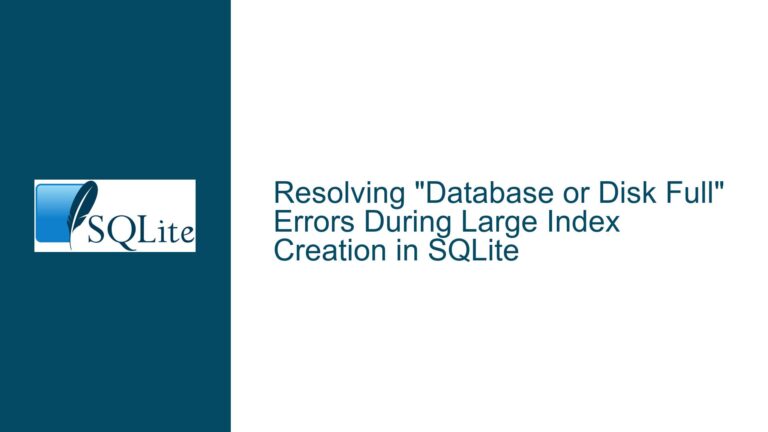SQLite’s ORDER BY Optimization with PRIMARY KEY Columns
Issue Overview: SQLite’s ORDER BY Clause Optimization with PRIMARY KEY Columns
In SQLite, the ORDER BY clause is a fundamental part of query execution, used to sort the result set based on specified columns or expressions. However, when the ORDER BY clause includes a PRIMARY KEY column alongside a function that would normally raise an error, SQLite’s behavior can appear counterintuitive. Specifically, in the provided example, the query SELECT t1.c0 FROM t1 ORDER BY t1.c0, json_array_length(0, 0); does not raise an error, even though json_array_length(0, 0) is an invalid function call. This behavior is due to SQLite’s internal optimization mechanisms, which aim to minimize unnecessary computations.
The core issue revolves around understanding why SQLite does not evaluate the json_array_length(0, 0) function in this context. The PRIMARY KEY column t1.c0 plays a significant role in this optimization. Since t1.c0 is the PRIMARY KEY, SQLite can determine the order of the result set without needing to evaluate the additional expression in the ORDER BY clause. This optimization is not a bug but rather a deliberate design choice to improve query performance by avoiding redundant computations.
To fully grasp this behavior, it is essential to delve into SQLite’s query execution process, particularly how it handles the ORDER BY clause and PRIMARY KEY columns. SQLite’s query planner and optimizer are designed to minimize the number of operations required to execute a query. When a PRIMARY KEY column is used in the ORDER BY clause, SQLite can leverage the inherent order of the PRIMARY KEY to sort the result set, thereby bypassing the need to evaluate additional expressions that do not affect the final order.
This optimization is particularly relevant in scenarios where the ORDER BY clause includes both a PRIMARY KEY column and a function or expression that would typically raise an error. In such cases, SQLite’s ability to skip the evaluation of the error-prone expression can lead to unexpected but correct results. Understanding this behavior is crucial for database developers who rely on SQLite for their applications, as it can impact both query performance and error handling.
Possible Causes: Why SQLite Skips Function Evaluation in ORDER BY with PRIMARY KEY
The primary cause of SQLite’s behavior in this scenario lies in its query optimization strategies. SQLite is designed to be a lightweight, efficient database engine, and one of its key optimizations is to avoid unnecessary computations whenever possible. When a query includes an ORDER BY clause with a PRIMARY KEY column, SQLite can often determine the order of the result set without evaluating additional expressions. This is because the PRIMARY KEY column inherently provides a unique and ordered sequence of values, which SQLite can use directly to sort the result set.
In the example query SELECT t1.c0 FROM t1 ORDER BY t1.c0, json_array_length(0, 0);, the PRIMARY KEY column t1.c0 is sufficient to determine the order of the result set. Since t1.c0 is the PRIMARY KEY, SQLite knows that the values in this column are unique and already ordered. As a result, SQLite does not need to evaluate the json_array_length(0, 0) function to determine the order of the rows. This optimization allows SQLite to skip the evaluation of the function, thereby avoiding the error that would normally be raised by the invalid function call.
Another factor contributing to this behavior is SQLite’s lazy evaluation strategy. SQLite only evaluates expressions when absolutely necessary. In the context of the ORDER BY clause, if the order of the result set can be determined without evaluating a particular expression, SQLite will skip that evaluation. This approach is particularly beneficial for performance, as it reduces the number of computations required to execute a query. However, it can also lead to situations where expressions that would normally raise errors are not evaluated, resulting in unexpected but correct query results.
It is also worth noting that SQLite’s query planner and optimizer are highly context-sensitive. The decision to skip the evaluation of an expression in the ORDER BY clause depends on the specific structure of the query and the presence of a PRIMARY KEY column. In queries where the ORDER BY clause does not include a PRIMARY KEY column, or where the order cannot be determined solely based on the PRIMARY KEY, SQLite may evaluate all expressions in the ORDER BY clause, potentially raising errors as expected.
Troubleshooting Steps, Solutions & Fixes: Handling ORDER BY Optimization in SQLite Queries
To effectively troubleshoot and address issues related to SQLite’s ORDER BY optimization with PRIMARY KEY columns, database developers should follow a systematic approach. The first step is to understand the specific behavior of SQLite’s query optimizer and how it interacts with PRIMARY KEY columns in the ORDER BY clause. This understanding will help developers anticipate when SQLite might skip the evaluation of certain expressions and avoid potential pitfalls in their queries.
One common scenario where this optimization can cause confusion is when the ORDER BY clause includes both a PRIMARY KEY column and a function or expression that would normally raise an error. In such cases, developers should carefully consider whether the function or expression is necessary for determining the order of the result set. If the PRIMARY KEY column alone is sufficient to determine the order, the function or expression can be safely removed from the ORDER BY clause. This not only avoids potential errors but also improves query performance by reducing unnecessary computations.
However, if the function or expression is essential for determining the order of the result set, developers should ensure that it is evaluated correctly. One way to achieve this is by restructuring the query to force SQLite to evaluate the expression. For example, developers can use a subquery or a Common Table Expression (CTE) to explicitly evaluate the expression before applying the ORDER BY clause. This approach ensures that the expression is evaluated and any potential errors are raised as expected.
Another important consideration is the use of indexes in conjunction with the ORDER BY clause. While PRIMARY KEY columns inherently provide an ordered sequence of values, other columns may require explicit indexing to optimize the ORDER BY clause. Developers should analyze their queries and ensure that appropriate indexes are in place to support efficient sorting. This is particularly important in queries where the ORDER BY clause includes multiple columns or complex expressions.
In cases where SQLite’s optimization behavior leads to unexpected results, developers can use the EXPLAIN command to gain insights into the query execution plan. The EXPLAIN command provides a detailed breakdown of how SQLite processes a query, including which indexes are used and how the ORDER BY clause is handled. By analyzing the output of the EXPLAIN command, developers can identify potential issues and make informed decisions about query optimization.
Finally, developers should be aware of the trade-offs involved in SQLite’s optimization strategies. While skipping the evaluation of unnecessary expressions can improve performance, it can also lead to unexpected behavior in certain scenarios. Developers should carefully balance the need for performance optimization with the need for predictable and reliable query results. By understanding the nuances of SQLite’s query optimizer and applying best practices for query design, developers can effectively troubleshoot and resolve issues related to ORDER BY optimization with PRIMARY KEY columns.
In conclusion, SQLite’s optimization of the ORDER BY clause with PRIMARY KEY columns is a powerful feature that can significantly improve query performance. However, it also requires careful consideration and understanding to avoid potential pitfalls. By following the troubleshooting steps and solutions outlined above, developers can effectively handle this optimization and ensure that their queries perform as expected.






